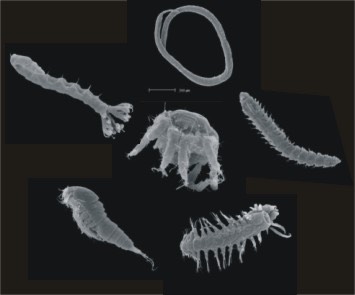How is it already the end of week 4…? Crazy. Time is starting to really fly by. Not a whole lot of new stuff has happened at work this week. The samples from our Tillamook field work are still being processed slowly but surely. A few fairly cool things did happen this week though.
First, I learned how to run particle size analysis (PSA) on sediment samples. While it may seem pretty useless to know what the sizes of your sediment grains are, this is actually very important information. By determining the particle sizes, you can infer lots of other info about the hydrology of the habitat. For instance, in marsh sediment samples PSA can help model how fast the marsh will drain as the tide goes out or how fast it will fill. I’m sure reading Jess’ blogs will give you more info about this since her research revolves around this kind of analysis. PSA also lets you infer what the microhabitat of the environment is like. The term “meiofauna” refers to organisms that spend their lives living in between sediment particles such as grains of sand on a beach. This is a very dynamic habitat and there is huge diversity in the taxa that call this environment home. The project I’m working on is mainly interested in how fecal indicator bacteria can colonize the top layer of sediment and potentially become resuspended by wave action and storm winds. For some reason I can’t caption the picture below but it’s a few of the representative meiofaunal taxa.
Second, Amy and I went on a road trip up Yaquina Bay Rd. to try and find some eelgrass sampling sites for my side project. All in all, we were pretty successful! We found three sites that were fairly accessible and easy to relocate so we can definitely resample them later in July. The mud was easier to deal with this time but I don’t think I’ll ever really enjoy standing on a surface that isn’t solid haha; my brother keeps making fun of me that I’m fine with freediving and skydiving but I hate walking on some soft mud. Something about solid ground giving way just isn’t natural haha. The mud was actually so bad in one site that Amy and I decided to butt-scooch down two fallen trees to get to the waterline. I’m sure anyone who saw us had a good laugh.
Third and finally, the results of the IDEXX tests targeting Fecal Coliform and Enterococci are continually returning high hits for eelgrass leaves! The loosely-attached biomass on eelgrass leaves is full of indicator bacteria and this result suggests that gentle agitation by rain, storm action, waves, and wake could release the bacteria into the water column. This is an important early result because it suggests that storm-based water sampling for indicator bacteria could be very inaccurate in Oregon and might be resulting in extended closures of shellfish harvesting areas.
On a non-work note I found out about an ultimate Frisbee league this week that happens every Monday and Thursday night in Newport. “League” might be a bit of an overstatement but it’s certainly a whole lot of fun! One of the researchers at the EPA and Jess’s boss, Jody Stecher, and his wife, Linda, are very into ultimate and always show up. Jess, another intern, Amy, and myself are actually going to their house tonight to make pasta. Not a bad way to round out week 4!
Image references:
http://www.marbef.org/wiki/Meiofauna_of_Sandy_Beaches



I’m sure you gave someone some good entertainment with your scooching! That’s great to hear that you individual project has had so much success. It is extremely impressive to be able to pull this off in such a short time frame; I’m glad the field work gods are cooperating with you!
Ooh, meiofauna! Sooo cool. And thanks for the PSA about PSA…was wondering what that acronym stood for…hope you enjoyed the pasta!